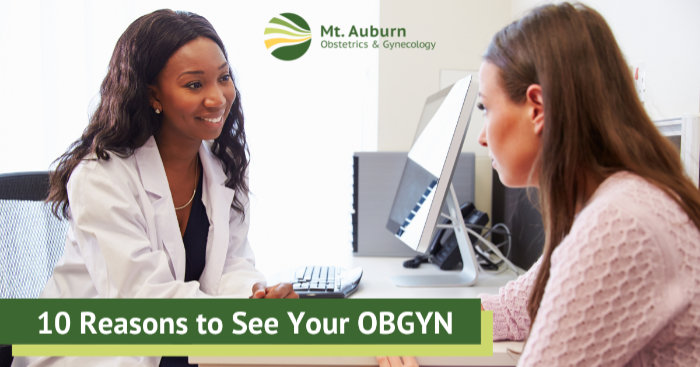Visiting the OBGYN can seem a bit more intimidating than a regular doctor’s visit—and it makes sense. All you need to do is see a speculum, let alone have one inside you, to feel a little scared.
But, avoiding your OBGYN, whether on purpose or by accident, can lead to untreated health issues. Here are 10 reasons you should see your OBGYN. While you likely know some of them, others might surprise you.
1. You want to start, change, or stop your birth control.
Almost 90% of all women will use contraceptives in their lifetime, and most contraceptive options were developed for women specifically.
You should schedule a visit to your OBGYN if you want to start taking the pill or talk about other birth control options such as an IUD, NuvaRing, birth control shots, or sterilization.
And if you want to stop taking the pill or switch methods, a visit to your OBGYN will help you stay informed about what potential side effects you might experience or why one method could be better for you than another.
2. You suspect you have a vaginal infection or STD.
OBGYNs can help you with any issues you might experience down there, and infections are one common issue that many women seek medication attention for.
If you notice funky discharge, irritation when you pee, persistent itchiness, or frequent urination, you probably have an infection of some sort. Whether you’re suffering from a yeast infection, UTI, or STD, your OBGYN can help.
3. Your periods are intolerable.
It’s normal to feel less-than-great when you’re on your period, but extreme pain and a heavy flow could signal that something is wrong.
Here are some signs that your period symptoms are worse than the average person.
An extremely heavy flow. Excessive bleeding means you bleed through your tampons or pads within two hours or less. If your clots are quarter-sized or larger, that could also be an issue.
Unusually long periods. Typical periods should last 4-8 days. If your period(s) last for more than a week, talk to your OBGYN.
Intense cramps. It’s no secret that cramps hurt. But if they make it near impossible for you to go about your daily life, your OBGYN could help you find ways to manage them.
Migraines, depression, and other severe PMS symptoms. It’s normal to feel moody, tired, and generally unwell when you’re on your period, but intense PMS symptoms could be a sign that something more than menstruation is going on.
4. Your periods are irregular or concerning.
If you’ve only had your period for 1-2 years, irregularity isn’t especially problematic. But, if you’re an adult and your periods skip months or you experience frequent spotting, you should definitely talk to your OBGYN.
5. Sex is painful, or you bleed during sex.
Sex should never be painful when you don’t want it to be.
Sometimes penetration can cause pain when something hits the cervix at a bad angle or the vagina isn’t lubricated enough. Other than that, any pain you experience during sex should be brought up at a visit to your OBGYN.
Some people will also bleed slightly when they try penetration for the first time, but if bleeding persists (and it’s not menstrual blood), talk to your OBGYN as soon as possible.
6. You’re due for a pap smear or pelvic exam.
Once you start having sex, it’s a good idea to have a yearly internal pelvic exam for preventative care. After you turn 21, a part of your pelvic exam includes a pap smear to test for cervical cancer.
If you’re due for your yearly visit or you haven’t seen your OBGYN in more than a year, it’s time to make an appointment.
7. You’re at risk of breast cancer.
A key part of preventative care at your OBGYN includes exams to screen for breast cancer. Usually, these exams are only recommended for women over 40, however, they are suggested sooner for women with a family history of breast cancer
It’s important to see your OBGYN regularly, especially if you’re at risk. Early detection means early treatment and a longer life.
8. You are, were, or want to become pregnant.
Of course, your OBGYN can help you with any pregnancy-related matters, whether you’re trying to conceive, are pregnant, or were pregnant recently. If you live in a state where you have access to abortion, your OBGYN can also provide information on these services.
9. You’re over fifteen and you’ve never been to the OBGYN before.
Some people feel like they just don’t have a reason to visit the OBGYN. Maybe you’ve never had sex, haven’t started your period yet, or both. Either way, every person with a uterus should visit an OBGYN by the time they are 15.
10. You experience any pain or discomfort that could be related to your reproductive system.
Your OBGYN can help you with more issues than you think.
Abdominal pain could be a sign of ovarian cysts. Blood in the urine could point to infections. And other seemingly unrelated symptoms could be a sign of hormonal problems.
If you have a uterus and feel unwell in any way that might be related to your reproductive system, a trip to the OBGYN could shed some light on what’s happening.
